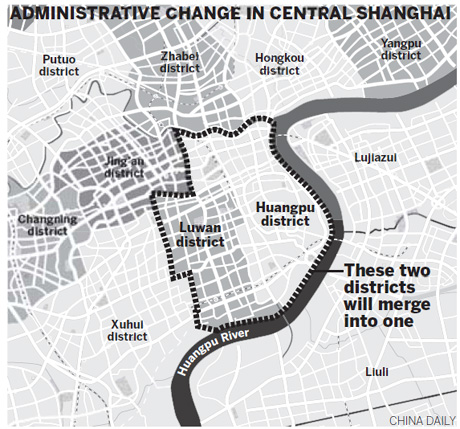Economy
Shanghai's merger plan gets a 'go'
By Yang Yijun and Wu Yiyao (China Daily)
Updated: 2011-06-09 07:56
 |
Large Medium Small |
SHANGHAI - The central government has accepted a plan to merge two districts in Shanghai, municipal government officials said on Wednesday.
Luwan district, the cradle of the Chinese Communist Party, and Huangpu district, home to the Bund area, will be merged to form the new Huangpu district, which will have an area of 20.5 square kilometers and a predicted population of 909,000.

Currently, Luwan covers 8.03 sq km and has a population of 269,400 and Huangpu covers 12.49 sq km and contains 429,900 residents.
Despite their much smaller sizes and populations compared to those of neighboring districts, both Luwan and Huangpu have good locations and a rich cultural heritage and are home to some of the most expensive properties in Shanghai.
Both districts lack enough momentum to boost rapid economic growth and the functions of the two district governments overlap in many aspects, officials explained.
The announcement of the merger provoked heated debate among those who work and live in the two districts, especially government employees, as some government positions in the two districts will be eliminated.
Dai Qiming, a young worker for the Luwan district government, said the move has dealt a blow to his career.
"I have been working for three years but I am still at the entry level. Now, all of a sudden, a lot more people will rush to compete for limited positions. How can I get promoted in the near future?" said Dai.
However, the merger is expected to have better results.
"The commercial properties in Huangpu district will be upgraded after the merger," said Lu Qilin, a researcher with the Shanghai-based real estate agency Shanghai Deovolente Realty.
Central Huaihai Road in Luwan district, for instance, is more developed than East Huaihai Road in Huangpu district. However, they are in fact two parts of one road.
"When the two districts are combined, the two roads will be developed as a whole so that the condition of the road's eastern section will be improved," Lu said.
Yu Hai, a sociologist at Shanghai-based Fudan University, said he is worried that the culture of Luwan district, where the city's major cultural attractions such as the former French Concession, Xintiandi and Tianzifang are located, may gradually disappear.
"Culture has a significant role in Shanghai. People from around the world come to the city not only to see its modern side, but also the cultural heritage and the fusion of the East and West. Luwan itself is a cultural brand of the city," he said.
"The new district authorities may need to consider how to protect the culture of Luwan after the merger," he said.
He Wei contributed to this story.
| 分享按钮 |



